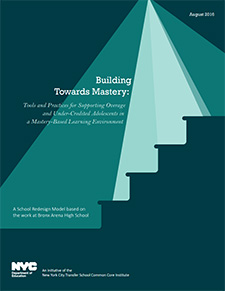Why take on mastery-based learning? Success in college and beyond depends not only on a student’s skills and content knowledge, but also in her ability to independently take ownership over her learning. However, even for the most vigilant student or teacher, it can be challenging to navigate the fast pace of planning, instruction, and assessment in schools to keep track of the individual steps that are crucial for learning. Mastery-based learning systems offer an approach to do just that—they help teachers and students effectively monitor learning and support independence through focused curricular planning. In our monograph entitled Building Towards Mastery, which is part of a series capturing practices and tools that support deeper learning for overage and under-credited adolescents at transfer schools across New York City, we share how Bronx Arena High School developed a mastery-based curriculum that empowered students to take ownership over their own learning, overcome their challenges, and achieve success in college and careers.
In 2013, Bronx Arena High School became a member of the Transfer School Common Core Institute (TSCCI), an innovative professional-development institute led by the NYCDOE’s Office of Postsecondary Readiness. The school used its participation in the TSCCI program to launch a multiyear effort to develop the school’s nascent mastery-based learning model into a rigorous system of instruction and assessment based on schoolwide competencies. With support from TSCCI partners Eskolta and reDesign, the school’s leadership and staff advanced ideas for achieving their vision for student learning, such as identifying core skills and sub-skills, measuring student growth, and personalizing instruction. As a result, the school has witnessed dramatic increases in student performance on state tests—including a 100 percent pass rate on the 2016 Common Core English Regents exam—as well as an improved graduation rate and college retention rate. As one Bronx Arena student shared, “Before I came [to Bronx Arena], I wouldn’t do [work] on my own because I would think it would be wrong, but now, I just do it, and if it is wrong, I change it.”
This report details how Bronx Arena designed the building blocks for their mastery-based approach and the classroom tools to support it.

